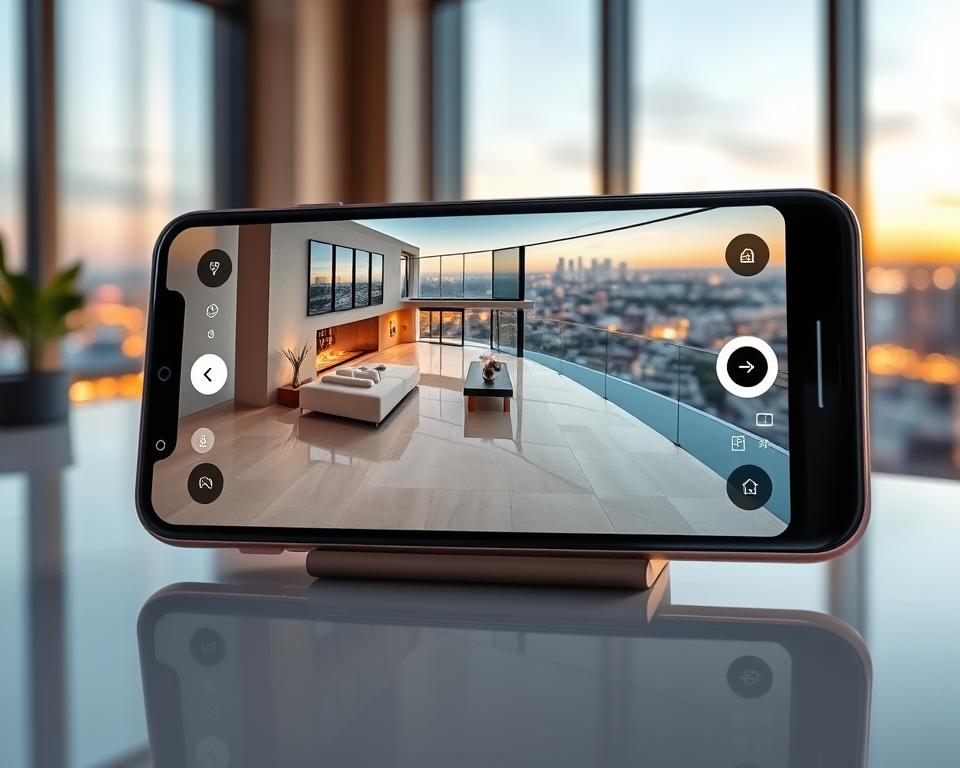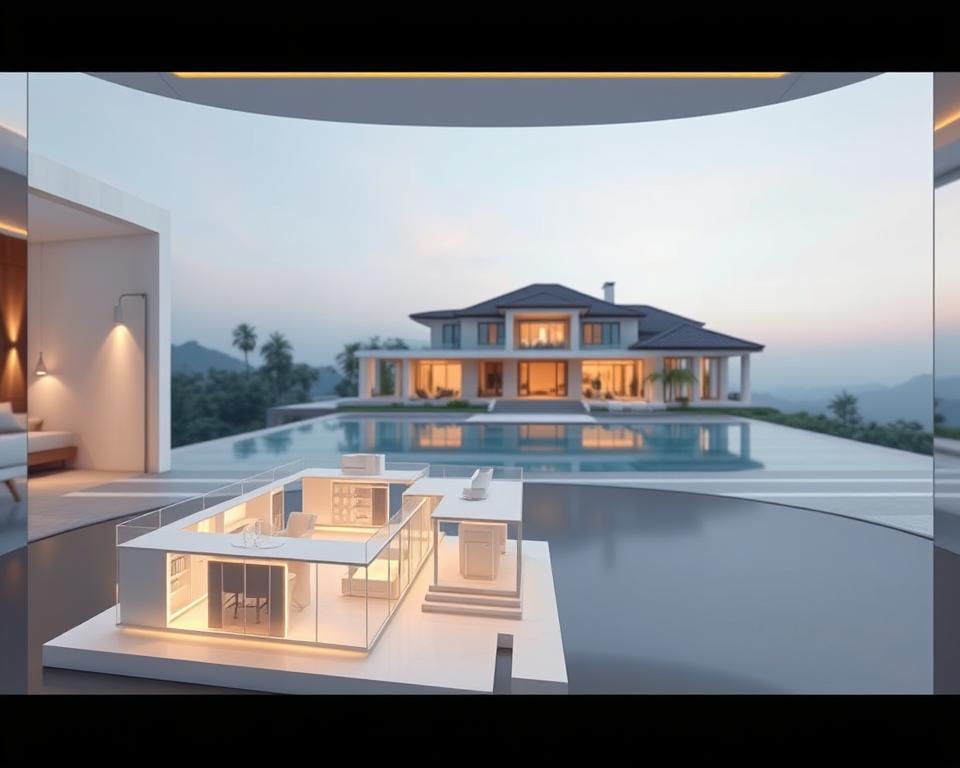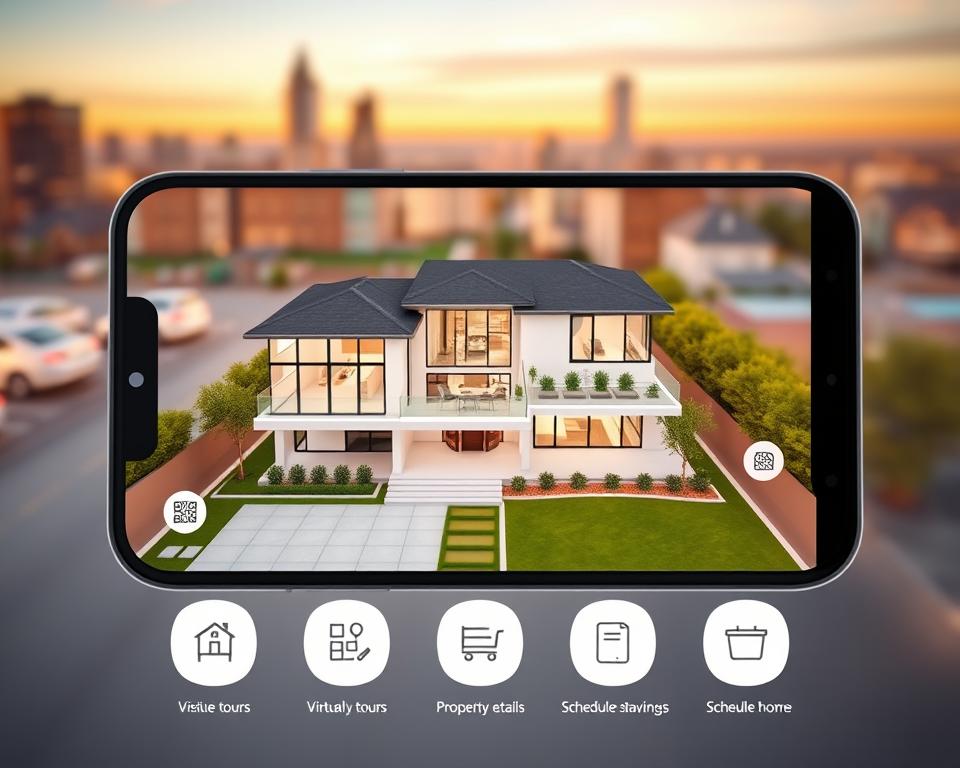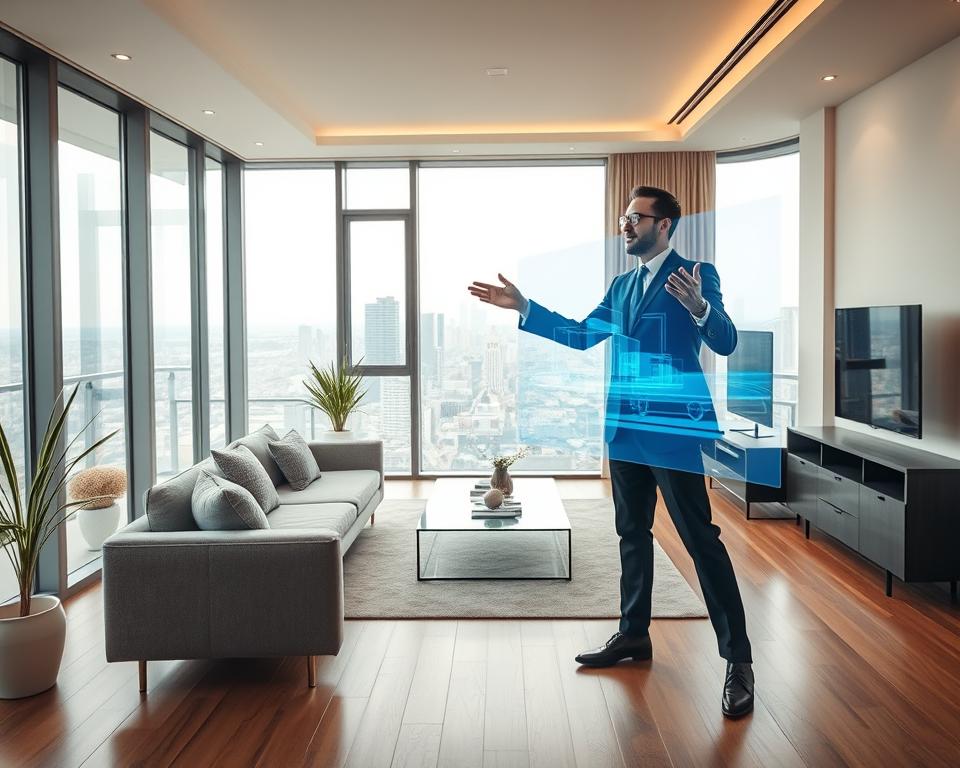The way we buy properties is changing fast, thanks to real estate apps with virtual tours. These new tools are making the real estate world more exciting and interactive. They give buyers a chance to see properties in a new way.
Virtual tours let buyers look at properties from anywhere, cutting down on the need for in-person visits. This change is not just for buyers. It’s also making a big impact on how real estate agents market and sell homes.
Table of Contents
Key Takeaways
- Real estate apps with virtual tours are transforming the property buying experience.
- Virtual tours enable remote property exploration, increasing efficiency.
- The use of virtual tours is changing real estate marketing and sales strategies.
- Buyers can now make more informed decisions with immersive property experiences.
- The real estate industry is becoming more tech-savvy with the adoption of virtual tours.
The Evolution of Property Buying in the Digital Age
The digital age has changed how we buy and sell properties. The real estate world, once slow and based on physical visits, now moves fast with digital tools.
Traditional Real Estate Challenges
Buying property used to be hard. It involved many visits, dealing with middlemen, and lots of paperwork. Potential buyers had to rely on static property listings and often faced challenges in visualizing the property. This made the process slow and limited by where you lived.
A study showed that nearly 70% of homebuyers drove around to find “For Sale” signs. This shows a lack of good online resources.
“The traditional home buying process is often cumbersome and involves a lot of legwork,” said a real estate expert.
The Digital Transformation of Real Estate
Digital real estate technology has changed everything. Now, buyers can see properties online with real estate apps and virtual tours. This digital change has made buying property easier and faster.
Technologies like 3D visualization and virtual reality have improved how we see properties. Data shows properties with virtual tours get 87% more views than those without.
| Traditional Methods | Digital Methods |
|---|---|
| Physical property visits | Virtual property tours |
| Static property listings | Interactive property listings |
| Geographical constraints | Global property access |
Understanding Virtual Tours in Real Estate
In recent years, virtual tours have become key in the real estate world. Technology’s growth is changing how we buy and sell properties.
What Are Virtual Property Tours?
Virtual property tours let people see properties online. They can explore and interact with them from anywhere. These tours show the property’s layout, features, and condition.
They use tech like 360-degree photos, 3D models, and video walkthroughs. This gives a real feel of visiting the property without leaving home.
A recent survey found that 75% of homebuyers see virtual tours as crucial when looking online. This shows how important they are in real estate.
Types of Virtual Tour Technologies
There are many virtual tour technologies, each with its own benefits.
360-Degree Photography
360-degree photography takes photos that stitch together for a panoramic view. It lets buyers explore the property’s layout in detail.
3D Modeling and Rendering
3D modeling and rendering make a digital version of a property. It helps buyers see the layout and features clearly. It’s great for new buildings or plans.
Video Walkthrough Tours
Video walkthrough tours show properties in a lively way. They use video to guide viewers through, pointing out key features.
Real estate pros use these technologies to give buyers a better experience. This can lead to more interest and sales.
Real Estate Apps with Virtual Tours: Changing Property Buying Forever
The use of virtual tours in real estate apps is changing how we buy properties. This change comes from new technology that makes viewing properties easier and faster.
The Technological Revolution in Property Viewing
The way we look at properties is changing a lot. Real estate apps with virtual tours lead this change. They offer a deep and interactive experience. These apps use 3D models and virtual reality for detailed virtual tours.
This makes the experience better and helps users understand the property’s layout and features.
Apps like Zillow and Redfin now have virtual tour features. This lets users explore properties from anywhere. A recent trend shows virtual tours are becoming more popular. A study found they improve the buying.
How Virtual Tours Address Traditional Pain Points
Virtual tours solve many old problems with property viewing. One big advantage is being able to filter out unsuitable properties without seeing them in person. This saves time and makes planning viewings easier.
Also, virtual tours let people see properties that are far away or hard to get to. This is great for those looking to buy in different cities or countries.
- Enhanced accessibility to properties
- Time and cost efficiency
- Improved decision-making through detailed virtual tours
Real estate apps with virtual tours are making buying properties more efficient, accessible, and easy to use.
Benefits for Home Buyers
Virtual tours have changed the way people buy homes. They let buyers look at properties online. This makes it easier and more flexible to explore the real estate market.
Time and Cost Efficiency
Virtual tours save time and money compared to visiting homes in person. Buyers can narrow down their options by looking at homes online. This cuts down the need for in-person visits.
“Virtual tours have been a game-changer for us,” says Jane Doe, a home buyer from California. “We were able to view multiple properties from the comfort of our current home, saving us both time and money.”
Enhanced Decision-Making Process
Virtual tours give buyers a detailed look at properties. They can explore properties at their own pace. This helps them make better decisions about their new home.
A survey by the National Association of Realtors found that 71% of buyers felt more confident after using virtual tours.
Access to Remote Properties
Virtual tours let buyers see properties in remote areas. This means buyers can look at homes far away without traveling. It opens up more options for buyers.
John Smith, a real estate expert, says, “Virtual tours have opened up new possibilities for home buyers. They can explore properties across different regions without the need for travel.”
Advantages for Sellers and Real Estate Agents
In today’s world, virtual tours are a game-changer for sellers and real estate agents. They offer a way to show off properties like never before. This tech is changing the real estate world, making marketing and selling easier and more effective.
Wider Reach and Market Exposure
Virtual tours let more people see properties online. This is great for homes in busy markets where standing out is key. Sellers and agents can draw in more viewers, including people from other countries or moving from far away.
Increased Efficiency and Reduced Showings
Virtual tours make it easier to show properties, saving time for everyone. They let serious buyers find homes online, cutting down on in-person visits. This saves time and hassle for sellers and agents.
Competitive Edge in the Market
Using virtual tours gives sellers and agents an edge in a crowded market. Homes with virtual tours seem more modern and appealing. This shows a commitment to using the latest tech to sell homes, making them stand out.
Top Real Estate Apps Featuring Virtual Tours
Top real estate apps now have virtual tours, changing how we buy properties. These apps make it easier for buyers to explore homes online. It’s a more fun and detailed way to see properties.
Zillow and Zillow 3D Home Tours
Zillow leads with 3D Home Tours in its app. It lets users see homes from afar. This gives a real feel of the property’s layout and condition.
Matterport-Powered Applications
Matterport tech is used in many real estate apps for high-quality virtual tours. These apps let users easily move through properties. They get to see all the property’s details.
Redfin and Virtual Walkthrough Technology
Redfin uses virtual walkthrough technology in its app. It makes exploring homes online easier. This saves time and effort for buyers.
Realtor.com’s 3D Tours
Realtor.com uses 3D Tours for a deeper experience. It offers a detailed and interactive view of properties. This helps buyers make better choices.
Trulia and Immersive Viewing Experiences
Trulia provides immersive viewing experiences with its virtual tours. It lets buyers dive deep into properties. They get a clear picture of the property’s layout and condition.
Advanced Features in Modern Real Estate Apps
Today’s real estate apps are changing how we look at properties. They make exploring homes more fun and informative. This is thanks to new features that make the experience better.
Augmented Reality Integration
Augmented Reality (AR) is now in real estate apps. It lets users see properties in a new way. Creating AR-enhanced apps uses cool tech to mix digital info with the real world. This lets buyers see how furniture fits without moving it.
As Forbes says, “AR is making real estate more fun and personal for buyers.”
Virtual Staging Capabilities
Virtual staging is getting popular too. It lets buyers see a property decorated virtually. This is great for empty homes or those needing a makeover.
Interactive Floor Plans
Interactive floor plans show a property’s layout in detail. Buyers can explore the space online. This helps them understand the property better.
Measurement Tools and Space Planning
Some apps have tools for measuring and planning spaces. These help users figure out furniture and decor. It’s all about making the most of the space.
“The future of real estate is not just about viewing properties; it’s about experiencing them in a whole new way.”
Technical Infrastructure Behind Virtual Tour Apps
To make high-quality virtual tours, a strong technical setup is needed. This setup includes many technologies and parts that work together. They provide immersive and interactive experiences for users.
Camera Technology and Hardware Requirements
The quality of virtual tours depends a lot on the camera technology used. High-resolution cameras and special equipment like 3D scanning cameras or drone-mounted cameras are often used. The hardware also needs powerful processors and enough storage to handle the big data from capturing.
Software Platforms and Development
Creating virtual tour apps involves advanced software platforms. These platforms help in making, editing, and hosting virtual tours. Developers use 3D modeling software and virtual tour tools to make interactive experiences. The software choice greatly affects the quality and function of the final product.
Cloud Integration and Data Management
Cloud integration is key for the scalability and accessibility of virtual tour apps. Hosting tours on cloud platforms ensures they are always available and data is managed well. This includes storing big files, managing user access, and analyzing user interactions. Good cloud integration is essential for a smooth user experience.
For more info on developing real estate apps, including virtual tours, visit Next Big Technology.
Impact on the Real Estate Market
Virtual tours in real estate apps are changing how buyers see properties. This new tech is deeply affecting the market. It’s changing what buyers expect and how much properties are worth.
Changing Buyer Expectations
Buyers now want a deeper, more interactive look at properties. Virtual tours offer this, making it easy to explore homes online. This lets buyers see properties whenever they want.
Market Reach and Property Value
Virtual tours are making properties more visible online. This attracts more people, including those from other countries and those who are busy. More interest can make properties more valuable.
For more insights on top real estate apps featuring virtual tours, you can visit Next Big Technology.
Statistical Evidence of Virtual Tour Effectiveness
Research shows virtual tours make listings more effective. Properties with virtual tours get more views and interest. Here are some key stats:
| Metric | Properties with Virtual Tours | Properties without Virtual Tours |
|---|---|---|
| Average Views per Listing | 500 | 200 |
| Engagement Rate | 30% | 15% |
| Time on Site | 5 minutes | 2 minutes |
Virtual Tours During the Pandemic and Beyond
The COVID-19 pandemic changed the real estate world. It made virtual tours a key solution. Buyers and sellers had to find new ways to see properties.
COVID-19 as an Accelerator
The pandemic pushed virtual tour tech forward fast. Reports show a big jump in virtual tour use during the pandemic. Virtual tours became a must-have, letting buyers see homes safely from afar. As Realtor.com said, “Virtual tours kept the real estate market moving when face-to-face visits were hard to do.”
Post-Pandemic Adoption Trends
Even after the pandemic, virtual tours will stay popular. They’re now a key part of real estate. Buyers like seeing homes online, and sellers get more people seeing their properties.
A recent survey said, “The pandemic showed us virtual tours are here to stay in real estate.” Now, we’ll see a mix of online and in-person viewings. This will make things easier and better for everyone.
Challenges and Limitations
Virtual tours are becoming more common, but they face some big challenges. They bring many benefits, but we need to tackle these issues to keep using them in real estate.
Technical Barriers and Costs
One big problem is the technical barrier and the cost. Making good virtual tours needs special tools and software, which can be pricey. The cost can be from a few hundred to thousands of dollars, based on how complex the tour is.
Also, not all places can have virtual tours because of internet issues in some areas.
The Irreplaceable Aspects of Physical Viewings
Even with great tech, some things about seeing a place in person can’t be beat. Buyers often want to see a property for themselves. They want to feel the neighborhood and see the area around it.
Physical visits also let buyers spot things they might miss online, like the property’s condition and the neighborhood’s quality.
Privacy and Security Concerns
Another issue with virtual tours is privacy and security concerns. Some people might not want to make virtual tours because of these worries. There’s a chance someone could use the tour for bad reasons, like looking for a place to break in.
To fix this, we need strong security, like data encryption and safe hosting. For more on making secure real estate apps, check out this resource on app development.
In summary, virtual tours have many benefits, but they also have challenges. We must work on these issues for virtual tours to keep growing in real estate. As tech gets better, we’ll see improvements that help solve these problems. For more on what’s coming next, see these expert predictions.
The Future of Virtual Tours in Real Estate
Virtual tours are changing the real estate market with new technologies. These advancements will make buying properties easier and more enjoyable.
Emerging Technologies and Innovations
New technologies like Artificial Intelligence (AI) and Virtual Reality (VR) are coming. They will change how we market and view properties.
- AI-powered virtual staging
- VR-enabled immersive viewing experiences
- Enhanced data analytics for better market insights
For more info on new mobile app solutions in real estate, check out Next Big Technology.
Integration with Smart Home Technology
Virtual tours are now working with smart home technology. This lets buyers see properties online and control smart features from afar.
- Remote access to property features
- Enhanced security through smart locks and cameras
- Energy efficiency through smart thermostats
Predictions for Market Integration
Virtual tours are becoming more common, changing how we market and sell properties. This shift will make things more efficient and save money for everyone involved.
| Year | Virtual Tour Adoption Rate | Expected Market Impact |
|---|---|---|
| 2024 | 40% | Increased buyer engagement |
| 2025 | 60% | Reduced time on market |
| 2026 | 80% | Enhanced market transparency |
Conclusion
The real estate world has changed a lot with virtual tours. These tours have made buying and selling homes easier. Real estate apps with virtual tours are now key players, offering a new way to see homes.
Virtual tours save time and money and help buyers make better choices. They also let people see homes from far away. This tech has solved old problems, making it simpler to look at homes online.
The future of real estate apps with virtual tours is bright. New tech will make buying homes even better. As things keep changing, virtual tours will play a big role in the real estate world. They will change how homes are shown and sold.



















